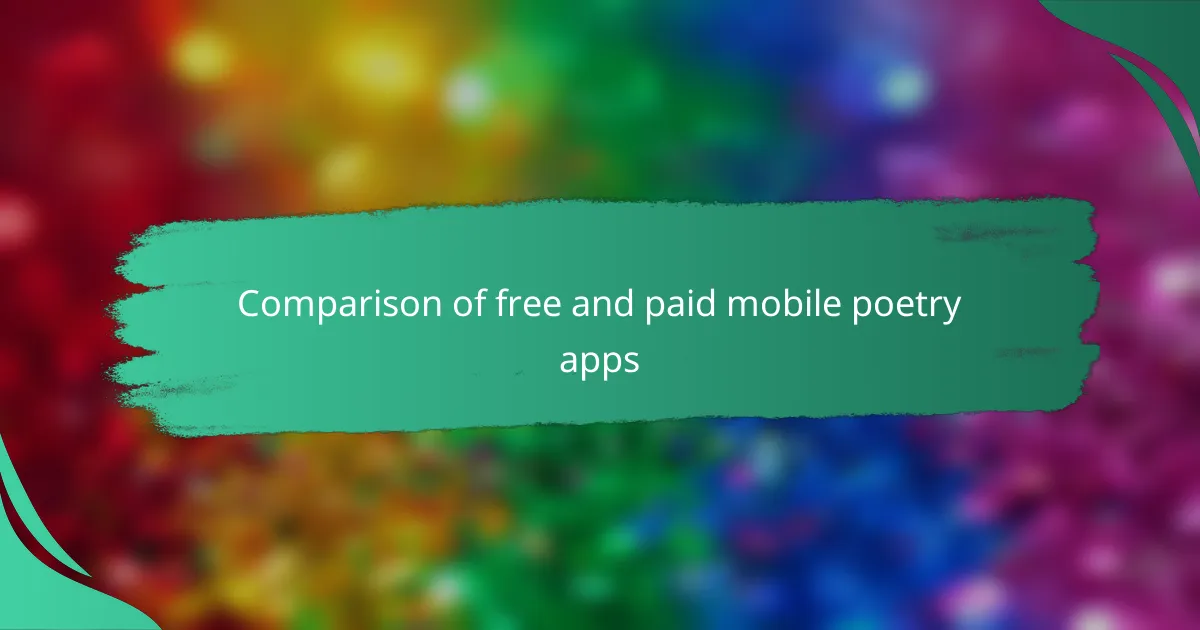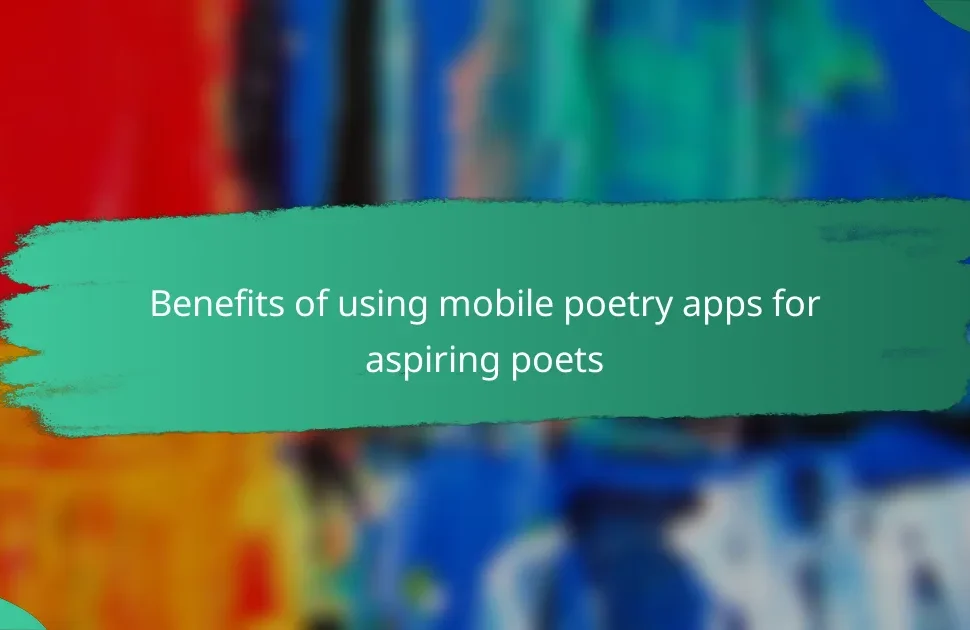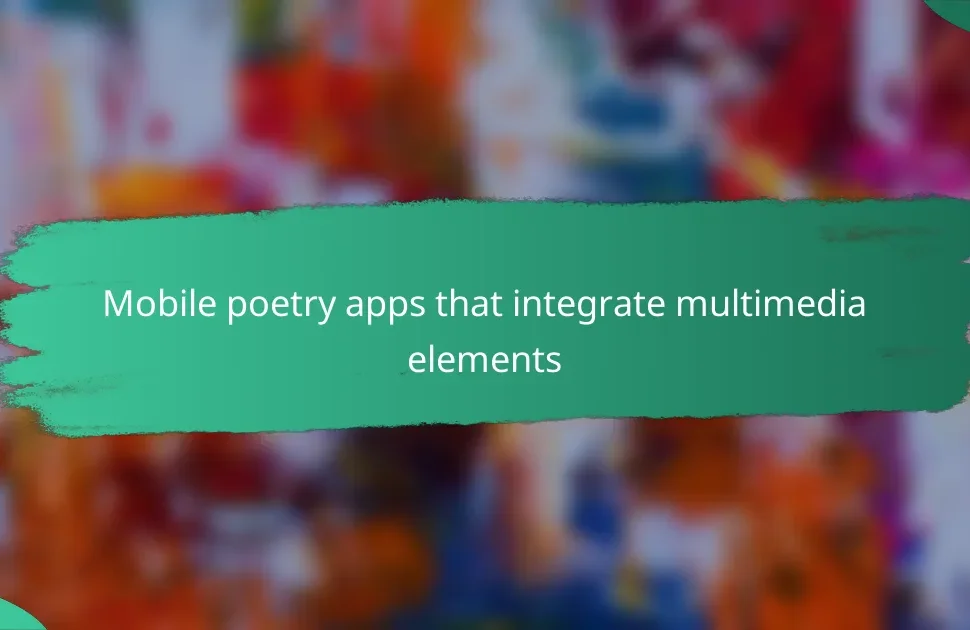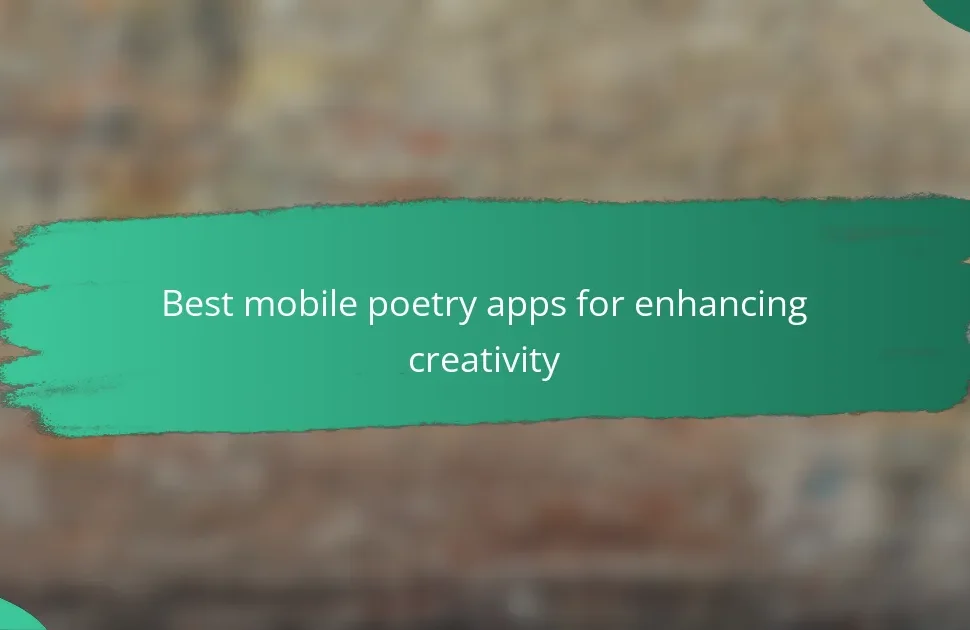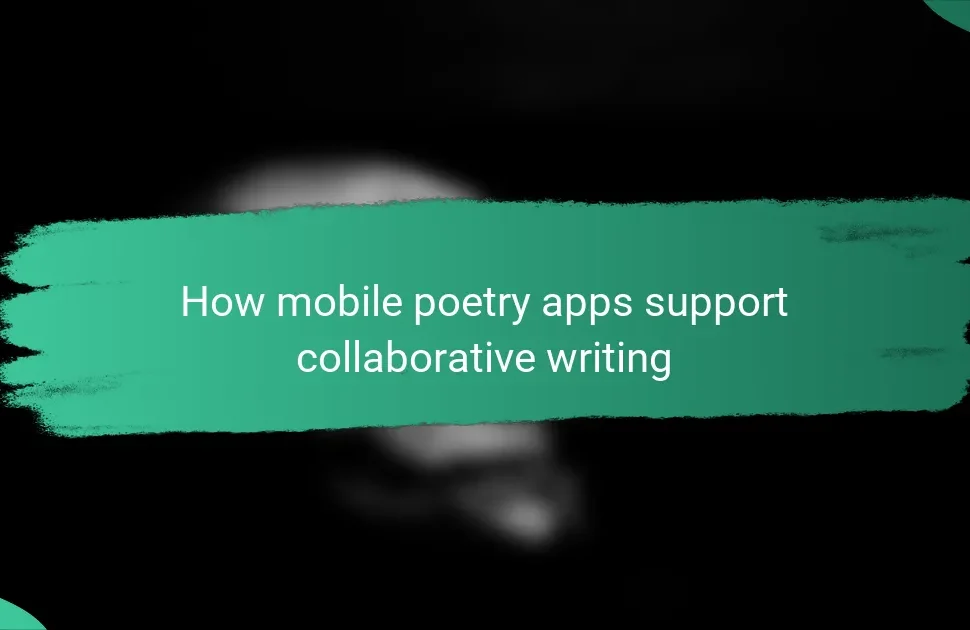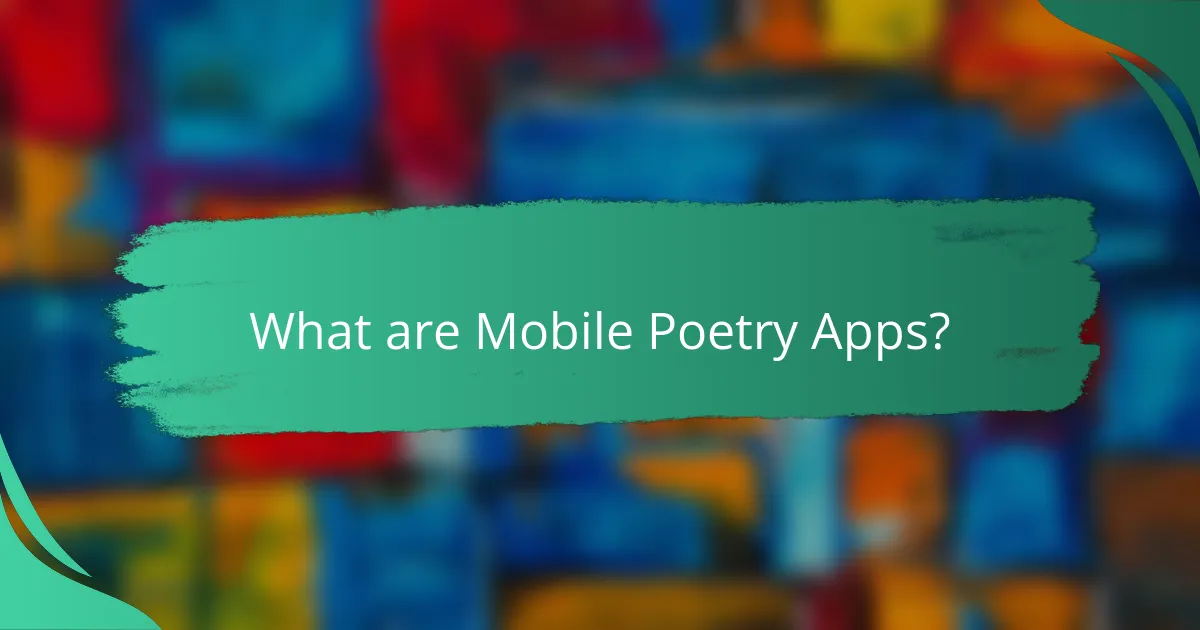
What are mobile poetry apps?
Mobile poetry apps are applications designed for creating, sharing, and reading poetry on mobile devices. These apps provide tools for writing, editing, and formatting poems. Users can often share their work with a community or receive feedback. Some apps include features for discovering new poetry or following favorite poets. Mobile poetry apps can be free or paid, with varying levels of functionality. Free versions typically offer basic features, while paid versions may include advanced tools or ad-free experiences. Popular examples include Poetizer and Poet Assistant, which cater to different user needs.
How do mobile poetry apps function?
Mobile poetry apps function by providing users with tools for creating, sharing, and discovering poetry. These apps typically feature text editors that allow users to write and format their poems. Many apps offer prompts or themes to inspire creativity. Users can often share their work with a community or on social media platforms. Some apps include audio features for users to record their poetry readings. Additionally, many mobile poetry apps provide access to a library of existing poetry for inspiration. Paid versions may offer enhanced features such as advanced editing tools, ad-free experiences, or exclusive content. Overall, mobile poetry apps serve as a platform for both creation and connection within the poetry community.
What features are common in mobile poetry apps?
Common features in mobile poetry apps include text editing tools, sharing options, and a library of poems. Text editing tools allow users to format their poetry with various fonts and styles. Sharing options enable users to publish their work on social media or within the app community. A library of poems provides access to a collection of classic and contemporary works for inspiration. Many apps also offer writing prompts to stimulate creativity. User-friendly interfaces enhance accessibility for all skill levels. Some apps include audio recording features for spoken poetry. Additionally, community forums facilitate interaction and feedback among users.
How do these features enhance user experience?
Features in mobile poetry apps enhance user experience by providing tailored functionalities. Customization options allow users to personalize their interface, making navigation intuitive. Access to exclusive content in paid apps offers a richer literary experience. Offline access ensures users can read poetry anytime, enhancing convenience. User-friendly design improves engagement and reduces frustration. Community features foster interaction among users, promoting a sense of belonging. Regular updates in paid versions keep content fresh and relevant. These aspects collectively lead to increased satisfaction and prolonged app usage.
What types of mobile poetry apps are available?
Mobile poetry apps are categorized into several types. These include writing and editing apps, which allow users to create and format their poems. There are also poetry discovery apps, enabling users to explore and read works from various poets. Additionally, there are collaborative poetry apps, where users can co-create poems in real-time. Some apps focus on poetry prompts and exercises to inspire creativity. Lastly, there are publishing apps, which help users share their poetry with a wider audience. Each type serves a unique purpose in enhancing the poetry experience.
What distinguishes free mobile poetry apps from paid ones?
Free mobile poetry apps typically offer limited features compared to paid ones. Free apps may include basic functionalities such as reading and writing poetry. However, they often lack advanced tools like editing options, personalized recommendations, or offline access. Paid apps generally provide a more comprehensive user experience. They often include premium features like enhanced editing tools, community engagement options, and ad-free usage. According to a survey by App Annie, users are willing to pay for apps that provide better functionality and user experience. This willingness highlights the value placed on the additional features found in paid poetry apps.
What unique features do paid mobile poetry apps offer?
Paid mobile poetry apps offer unique features such as ad-free experiences, exclusive content, and enhanced user interfaces. These apps often include premium poetry collections that are not available in free versions. Users can access advanced writing tools and customization options for personalizing their poetry. Many paid apps provide offline access to content, allowing users to read or write anywhere without internet connectivity. Additionally, paid apps may offer community features like workshops and forums for feedback and collaboration. Some also include audio features, enabling users to listen to poetry readings. These unique attributes enhance the overall user experience and foster a deeper engagement with poetry.
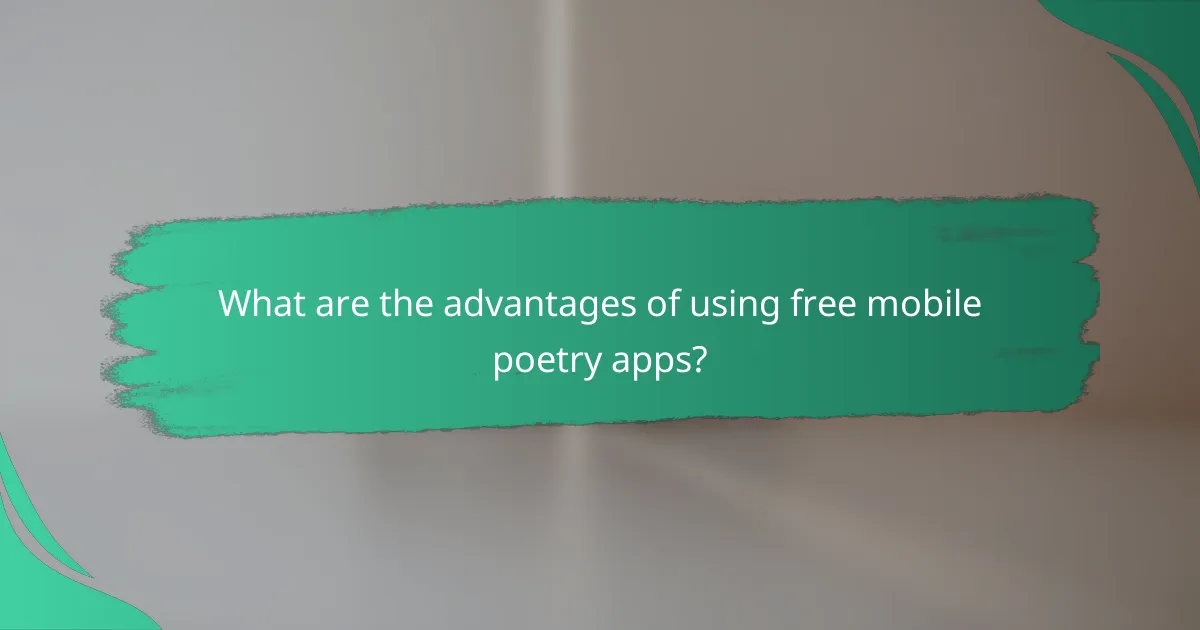
What are the advantages of using free mobile poetry apps?
Free mobile poetry apps offer accessibility and convenience for users. They allow anyone with a smartphone to explore poetry without financial barriers. Users can read, write, and share poetry easily. Many apps provide a variety of poetic forms and prompts to inspire creativity. Free apps often include community features for feedback and collaboration. They also allow users to discover new poets and styles. Statistics show that mobile app usage has increased significantly, indicating a growing interest in poetry through digital platforms. Overall, free mobile poetry apps democratize poetry for a wider audience.
How do free mobile poetry apps cater to budding poets?
Free mobile poetry apps cater to budding poets by providing accessible tools for creativity and expression. These apps typically offer features such as writing prompts, rhyme dictionaries, and editing tools. They also enable users to share their work with a community for feedback. Many apps include educational resources to improve writing skills. Additionally, they often host challenges and contests to encourage participation. Some platforms provide a space for collaboration with other poets. The absence of cost removes barriers for new writers, allowing experimentation without financial risk. Overall, these features foster a supportive environment for emerging poets.
What limitations do users face with free mobile poetry apps?
Users face several limitations with free mobile poetry apps. These apps often include intrusive advertisements that disrupt the user experience. Limited features are common, restricting access to advanced tools for writing and editing. Users may encounter a lack of offline access, requiring a constant internet connection for functionality. Additionally, free apps frequently offer a smaller library of poetry resources compared to paid versions. The quality of customer support is often minimal, leaving users without assistance. Lastly, users may face restrictions on sharing or publishing their work, limiting their creative expression.
How can users maximize their experience with free apps?
Users can maximize their experience with free apps by understanding their features and limitations. First, they should explore all available functionalities within the app. This includes checking settings and preferences for customization options. Users should also read reviews and guides to gain insights into effective usage. Engaging with community forums can provide tips and tricks from experienced users. Additionally, users should regularly update the app to access new features and improvements. Limiting background processes can enhance performance and battery life. Lastly, users can take advantage of any promotional offers for premium features to enhance their experience. These strategies help users make the most of free apps while navigating their constraints effectively.
What are the drawbacks of free mobile poetry apps?
Free mobile poetry apps often have limitations that affect user experience. Many include advertisements that disrupt reading and writing. Users may encounter restricted features compared to paid versions. Limited access to premium content can hinder creativity. Some apps lack offline functionality, requiring an internet connection. Data privacy concerns arise, as user information may be collected. The quality of poetry recommendations can be inconsistent. Lastly, customer support for free apps is often minimal or non-existent.
How do ads impact the user experience in free apps?
Ads negatively impact the user experience in free apps. They can interrupt the flow of usage, causing frustration. Users often face delays when ads load or play. This disruption can lead to decreased engagement with the app. Research shows that 70% of users find ads in apps annoying. Additionally, ads can consume valuable screen space, limiting content visibility. This can detract from the overall aesthetic and functionality of the app. Ultimately, excessive ads may lead users to uninstall the app altogether.
What features are often restricted in free versions?
Free versions of mobile poetry apps often restrict advanced features. Common limitations include access to premium templates and themes. Users may also find that editing tools are simplified or unavailable. Collaboration features might be limited, preventing sharing with other users. Additionally, free versions frequently impose ads that disrupt the user experience. Export options may be restricted, limiting the ability to save or share work. Some apps may also limit the number of poems that can be created or saved. Overall, these restrictions encourage users to upgrade to paid versions for a fuller experience.
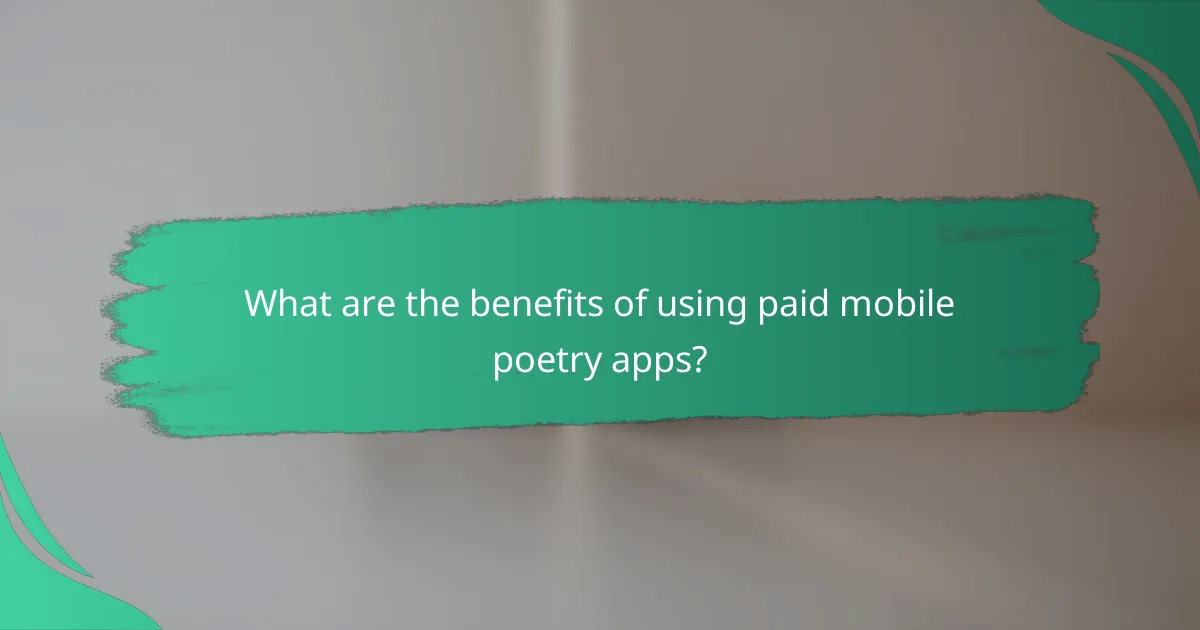
What are the benefits of using paid mobile poetry apps?
Paid mobile poetry apps offer enhanced features and content compared to free versions. Users gain access to exclusive poems and curated collections. These apps often provide an ad-free experience, allowing uninterrupted reading. Paid versions typically include advanced tools for writing and editing poetry. Users can benefit from community features, such as workshops and peer feedback. Regular updates and customer support are common in paid apps, ensuring a better user experience. Research shows that investing in quality apps can lead to improved creative output for writers.
How do paid mobile poetry apps enhance the creative process?
Paid mobile poetry apps enhance the creative process by providing advanced features that stimulate inspiration. These apps often include tools for rhyme, meter, and structure analysis, which help poets refine their work. They may offer curated prompts and challenges that encourage users to think outside their usual themes. Additionally, paid apps often provide a distraction-free writing environment, allowing for deeper focus. Many also include community features, enabling feedback and collaboration with other poets. Research indicates that structured feedback can significantly improve writing skills. Therefore, the investment in paid apps often leads to a more enriched and productive creative experience.
What exclusive features do users gain with paid apps?
Paid apps offer exclusive features such as ad-free experiences, enhanced functionality, and premium content access. Users typically enjoy personalized settings and advanced tools for creating or editing poetry. Additionally, paid apps often provide offline access to content, enabling uninterrupted usage. Many also include regular updates with new features and content. This ensures that users remain engaged and have access to the latest offerings. Furthermore, customer support tends to be more responsive for paid app users, enhancing overall satisfaction.
How do paid apps support the poetry community?
Paid apps support the poetry community by providing financial resources that facilitate the creation and distribution of poetry. They often offer features that enhance user experience, such as advanced editing tools and exclusive content. These features can attract more users, increasing revenue for developers. This revenue can be reinvested into community initiatives like poetry contests and workshops. Additionally, paid apps may provide a platform for emerging poets to publish their work. This exposure can lead to greater recognition and opportunities for these poets. Overall, paid apps help sustain and grow the poetry community by ensuring that creators are compensated for their work.
What are the potential downsides of paid mobile poetry apps?
Paid mobile poetry apps may have several potential downsides. Users often face high subscription costs, which can deter access. These costs can limit the audience to those willing to pay, reducing community diversity. Additionally, some paid apps may lack unique features compared to free alternatives. Users might find that free apps offer sufficient functionality, making payments unnecessary.
Moreover, paid apps may include intrusive advertisements or in-app purchases despite initial costs. This can frustrate users who expect an ad-free experience. Compatibility issues with different devices can also arise, leading to accessibility problems. Lastly, updates or support may be less frequent for paid apps, potentially leaving users with outdated content.
How can cost affect accessibility for users?
Cost can significantly affect accessibility for users. Higher costs can limit access to paid mobile poetry apps. Users may opt for free apps due to budget constraints. This choice often results in fewer features and lower quality. According to a study by Pew Research Center, 29% of adults in the U.S. cite cost as a barrier to accessing digital content. Free apps may also have ads, which can disrupt the user experience. In contrast, paid apps typically offer enhanced functionality and a more seamless experience. Therefore, the cost directly influences user access and overall satisfaction with mobile poetry apps.
What considerations should users keep in mind before purchasing?
Users should consider the features and functionalities offered by both free and paid mobile poetry apps before purchasing. Free apps may have limited features, while paid versions often provide advanced tools for writing and sharing poetry. Users should also evaluate the user interface and ease of navigation in each app. Compatibility with their devices is important as well. Additionally, they should check for user reviews and ratings to gauge satisfaction. Finally, users should consider the cost relative to the benefits provided, ensuring they receive value for their investment.
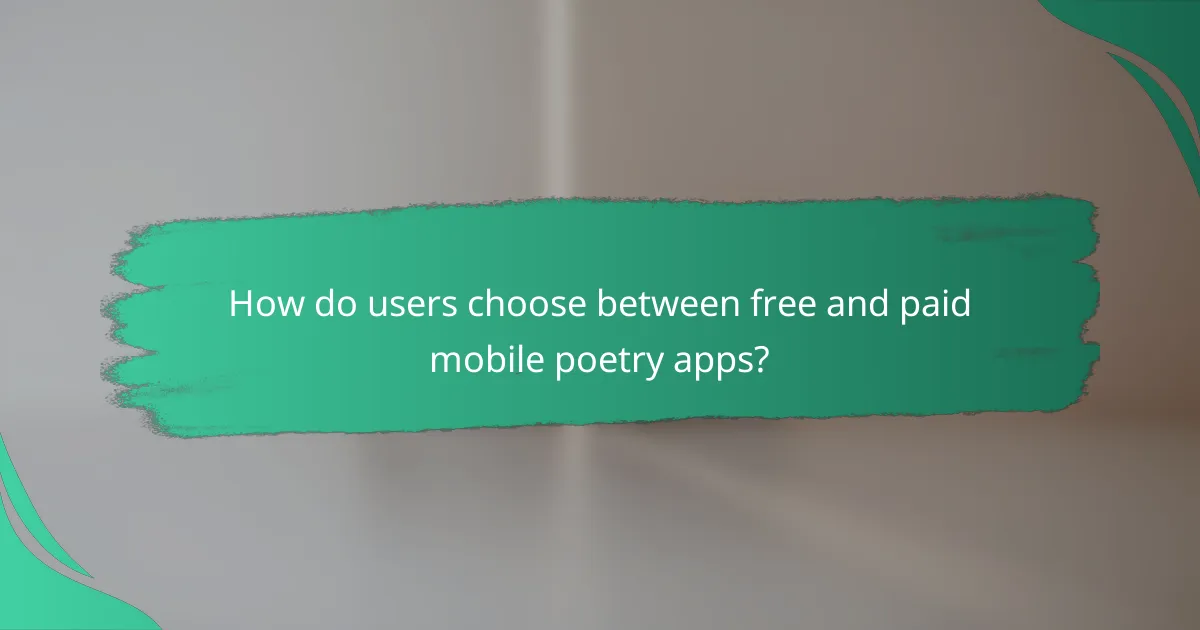
How do users choose between free and paid mobile poetry apps?
Users choose between free and paid mobile poetry apps based on features, usability, and content quality. Free apps often provide basic functionalities and limited content access. Users may prefer these for casual use or exploration. Paid apps typically offer advanced features, ad-free experiences, and exclusive content. Users often seek these for serious writing or in-depth poetry analysis. Price sensitivity also influences decisions; some users are willing to pay for enhanced experiences, while others prioritize free options. Research indicates that 70% of users try free versions before considering paid subscriptions. This trend highlights the importance of trial experiences in user decision-making.
What factors should influence a user’s decision?
Factors that should influence a user’s decision include cost, features, and user experience. Cost is a primary consideration as it determines budget constraints. Free apps may offer limited features, while paid apps typically provide more comprehensive tools. Features such as offline access, customization options, and community engagement enhance usability. User experience, including interface design and ease of navigation, significantly affects satisfaction. Reviews and ratings from other users provide insights into app performance. The availability of updates and customer support can also impact long-term satisfaction. These factors collectively guide users in selecting the most suitable mobile poetry app.
How can user reviews inform the choice between free and paid apps?
User reviews can significantly inform the choice between free and paid apps by providing insights into user satisfaction and functionality. Reviews often highlight the strengths and weaknesses of each app. For instance, free apps may have limitations in features or ads, which users commonly mention. Conversely, paid apps might be praised for better performance and fewer interruptions.
Statistical analysis shows that apps with higher ratings often correlate with better user experiences. According to a study by Apptopia, paid apps tend to receive more positive reviews than free ones, indicating user willingness to invest for enhanced quality. Additionally, user feedback can reveal hidden costs associated with free apps, such as in-app purchases.
By analyzing user reviews, potential users can gauge whether a free app meets their needs or if a paid app offers better value for money.
What are some tips for selecting the right mobile poetry app?
When selecting the right mobile poetry app, consider user interface and ease of navigation. A clean design enhances user experience and encourages creativity. Evaluate the features offered, such as writing tools, editing options, and formatting capabilities. Check for community features like sharing and feedback options. Research user reviews and ratings to gauge satisfaction and reliability. Assess compatibility with your device’s operating system for seamless functionality. Finally, explore whether the app offers a free trial or demo version to test its features before committing to a purchase.
How can users identify their specific poetry needs?
Users can identify their specific poetry needs by assessing their interests and preferences in poetry. They should consider the types of poetry that resonate with them, such as classic, contemporary, or specific genres. Users can also reflect on their goals, whether they want to read for enjoyment, education, or inspiration. Evaluating their preferred forms of engagement, such as reading, writing, or sharing poetry, can help clarify their needs. Additionally, exploring features offered by poetry apps, like curation, community interaction, or writing tools, can guide users in identifying what they seek. Engaging with free apps allows users to experiment without commitment, while paid apps may offer advanced features that cater to specific needs.
What resources are available for comparing mobile poetry apps?
Resources for comparing mobile poetry apps include online review platforms, app store ratings, and user forums. Websites like CNET and TechRadar provide expert reviews and comparisons. App store ratings on Google Play and Apple App Store offer user feedback on features and usability. User forums, such as Reddit, allow discussions and recommendations from actual users. Additionally, blogs dedicated to poetry and writing often feature app comparisons. These resources ensure comprehensive insights into features, pricing, and user experiences.
Mobile poetry apps are digital applications that facilitate the creation, sharing, and reading of poetry on mobile devices. This article compares free and paid mobile poetry apps, highlighting their features, functionalities, and user experiences. Key topics include the common tools offered by these apps, the advantages and limitations of free versus paid versions, and the unique attributes that enhance user engagement and creativity. Additionally, the article discusses how users can choose the right app based on their specific poetry needs and preferences, providing insights into community support and accessibility considerations.
